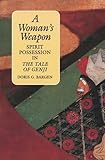A Woman's Weapon : Spirit Possession in The Tale of Genji / Doris G. Bargen.
Material type: TextPublisher: Honolulu : University of Hawaii Press, [1997]Copyright date: ©1997Description: 1 online resource (420 p.)Content type:
TextPublisher: Honolulu : University of Hawaii Press, [1997]Copyright date: ©1997Description: 1 online resource (420 p.)Content type: - 9780824861322
- 895.6/31 20
- PL788.4.G43 B37 1997eb
- online - DeGruyter
| Item type | Current library | Call number | URL | Status | Notes | Barcode | |
|---|---|---|---|---|---|---|---|
 eBook
eBook
|
Biblioteca "Angelicum" Pont. Univ. S.Tommaso d'Aquino Nuvola online | online - DeGruyter (Browse shelf(Opens below)) | Online access | Not for loan (Accesso limitato) | Accesso per gli utenti autorizzati / Access for authorized users | (dgr)9780824861322 |
Browsing Biblioteca "Angelicum" Pont. Univ. S.Tommaso d'Aquino shelves, Shelving location: Nuvola online Close shelf browser (Hides shelf browser)

|

|

|

|

|

|

|
||
| online - DeGruyter A Poetics of Courtly Male Friendship in Heian Japan / | online - DeGruyter A Tale of False Fortunes / | online - DeGruyter A Wild Deer amid Soaring Phoenixes : The Opposition Poetics of Wang Ji / | online - DeGruyter A Woman's Weapon : Spirit Possession in The Tale of Genji / | online - DeGruyter Absolute Delusion, Perfect Buddhahood : The Rise and Fall of a Chinese Heresy / | online - DeGruyter Academies and Society in Southern Sung China / | online - DeGruyter Acting the Right Part : Political Theater and Popular Drama in Contemporary China / |
Frontmatter -- Contents -- Acknowledgments -- Emblems -- Introduction -- Enter mono no ke: Spirit Possession in Cultural Context -- Exit mono no ke: Spirit Possession in The Tale of Genji -- Appendix A: Genji Chronology -- Appendix B: Genealogical Charts -- Abbreviations -- Notes -- Bibliography -- Index
restricted access online access with authorization star
http://purl.org/coar/access_right/c_16ec
In this subtle and highly original reading of Murasaki Shikibu's 11th-century classic The Tale of Genji (Genji monogatari), Bargen explores the role of possessing spirits (mono no ke) from a female viewpoint. In several key episodes of the Genji, Heian noblewomen (or their mediums) tremble, speak in strange voices, and tear their hair and clothing while under the spell of mono no ke. For literary critics, Genji, the male protagonist, is central to determining the role of these spirits. From this male-centered perspective, female jealousy provides a convenient explanation for the emergence of mono no ke within the polygynous marital system of the Heian aristocracy. Yet this conventional view fails to take into account the work's female authorship and its largely female audience. Relying upon anthropological as well as literary evidence, Doris G. Bargen foregrounds the motives of the possessed character and locates mono no ke within the politics of Heian society, interpreting spirit possession as a female strategy adopted to counter male strategies of empowerment. Possessions become "performances" by women attempting to redress the balance of power; they subtly subvert the structure of domination and significantly alter the construction of gender.A Woman's Weapon will find an appreciative audience not only among Genji specialists but also among scholars in the fields of anthropology and gender studies who are curious about the complex phenomenon of spirit possession as reflected in the mirror of a major literary work.
Mode of access: Internet via World Wide Web.
In English.
Description based on online resource; title from PDF title page (publisher's Web site, viewed 29. Jun 2022)


